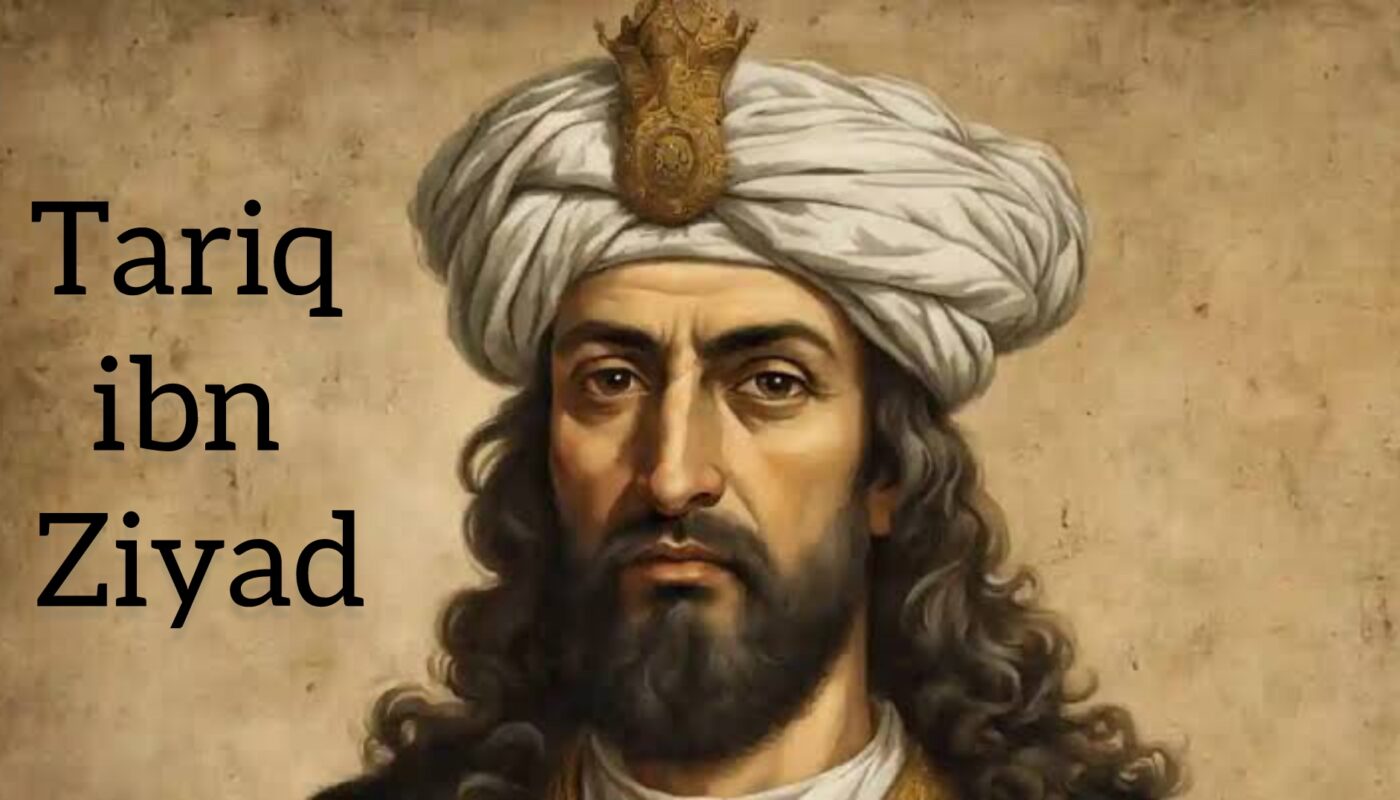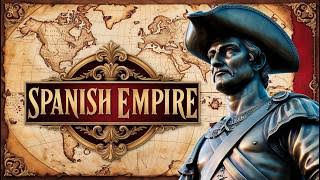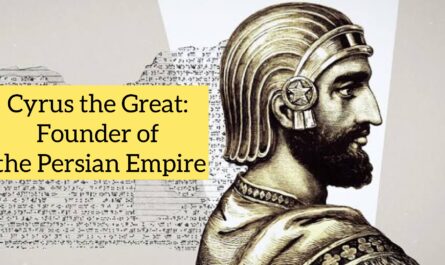- Introduction
Tariq ibn Ziyad (d. 720 CE) is one of the most significant figures in Islamic history, renowned for his role in the Muslim conquest of the Iberian Peninsula in 711 CE. His leadership and military strategy were pivotal in the establishment of Al-Andalus, the Muslim-ruled territory in Spain and Portugal. Tariq’s historical legacy is not just about his military victories, but also about the cultural, political, and religious transformations that ensued in the region following his conquests.
Early Life and Origins
Tariq ibn Ziyad was born in North Africa, most likely in the region of modern-day Algeria. He was a Berber by ethnicity, a member of the indigenous North African tribes, who were often converted to Islam in the early years of the Arab expansion. While details of his early life remain unclear, it is widely believed that he was a slave who rose to prominence due to his military skill and loyalty to the Umayyad Caliphate.
The Role of the Berbers in Early Islamic Expansion
The Berbers played a crucial role in the spread of Islam, especially in North Africa. As the Islamic empire expanded westward after the death of the Prophet Muhammad (PBUH), Berber tribes converted to Islam and became instrumental in the military campaigns against the Byzantine and Visigothic territories in North Africa and Spain. Tariq himself was a commander in the army of Musa ibn Nusayr, the governor of the Umayyad Caliphate in North Africa, under whom he led the historic invasion of the Iberian Peninsula.
The Conquest of Al-Andalus
Background: The Decline of the Visigothic Kingdom
In the early 8th century, the Visigothic Kingdom in Spain was in turmoil. The kingdom had been weakened by internal divisions and conflicts, especially after the death of King Rodrigo (Roderic) in 711 CE. The kingdom was ripe for external intervention. At the time, Musa ibn Nusayr, the governor of the Umayyad Caliphate in North Africa, saw an opportunity to expand Muslim rule into the Iberian Peninsula.
The Crossing of the Strait of Gibraltar (711 CE)
In 711 CE, Tariq ibn Ziyad was appointed as the commander of a small army of 7,000 Berber soldiers, tasked with leading the Muslim forces into Iberia. He landed at the Gibraltar Strait, a narrow stretch of water between Spain and North Africa, which is believed to have been named after him (Gibraltar comes from the Arabic “Jabal Tariq,” meaning “Mount of Tariq”).
Tariq’s famous landing at Gibraltar marked the beginning of a bold military campaign. The small Muslim army faced a much larger Visigothic army of around 100,000 soldiers led by King Roderic.
The Battle of Guadalete (711 CE)
The most significant battle of the Muslim conquest of Spain was the Battle of Guadalete, which took place near the Guadalete River in southern Spain. Despite the numerical disadvantage, Tariq ibn Ziyad employed brilliant tactics that led to a decisive victory.
Key Events of the Battle:
-
Surprise Tactics: Tariq’s army used guerrilla warfare tactics and ambushes to break the Visigothic formations.
-
King Roderic’s Defeat: In a crucial moment, Tariq’s forces managed to outmaneuver and defeat King Roderic’s larger army, leading to the king’s death in battle. The loss of Roderic signaled the collapse of Visigothic power in Spain.
-
Psychological Warfare: Tariq is famously said to have given an inspiring speech to his soldiers before the battle, motivating them with words such as:
“The sea is behind you, and the enemy is before you.”
The Aftermath and Expansion of Muslim Rule
Following the victory at Guadalete, Tariq and his forces continued their conquest across the Iberian Peninsula. Within a few years, the majority of the Visigothic territories fell into Muslim hands. The Muslim forces captured key cities like Seville, Córdoba, and Toledo, and rapidly expanded their influence throughout the region.
Role of Musa ibn Nusayr
After the initial success, Tariq was recalled to North Africa by his superior, Musa ibn Nusayr, who was eager to claim the credit for the conquest of Spain. However, when the full scale of the conquest became apparent, Musa joined Tariq in Iberia, bringing additional forces to solidify Muslim control over the peninsula.
Establishment of Al-Andalus
The Muslim rule in the Iberian Peninsula, known as Al-Andalus, would last for nearly 800 years, until the fall of the Nasrid Kingdom of Granada in 1492. Under the Umayyad Caliphate, Al-Andalus became a center of Islamic civilization, where Muslims, Christians, and Jews coexisted and contributed to a rich cultural, scientific, and intellectual environment.
Tariq’s Legacy
Although Tariq ibn Ziyad’s role in the conquest of Al-Andalus was brief, his impact on the history of Spain and the broader Islamic world was profound. His name became synonymous with military genius, and his actions paved the way for a vibrant period of Islamic rule in the Iberian Peninsula.
Key Aspects of His Legacy:
-
The Founding of Al-Andalus: Tariq’s successful invasion set the foundation for Muslim rule in Spain, which would lead to a flourishing of Islamic culture in the region for centuries.
-
Cultural Interactions: The Muslim presence in Spain facilitated significant cultural exchanges between the Islamic world, Europe, and North Africa. The Golden Age of Al-Andalus produced advances in science, philosophy, architecture, and mathematics that influenced Europe during the Middle Ages.
-
Religious Tolerance: While the Muslim rule in Al-Andalus did involve the dominance of Islam, it also saw relatively tolerant coexistence between Muslims, Christians, and Jews, particularly in the early centuries of Muslim rule.
-
Military Heroism: Tariq became a legendary figure in both Arab and Berber military history, revered for his strategic brilliance and his ability to inspire his soldiers. His victory at the Battle of Guadalete remains a critical turning point in the history of medieval Spain.
Death and Historical Recognition
Tariq ibn Ziyad’s later years remain shrouded in mystery, with varying accounts of his life after the conquest. It is believed that after returning to North Africa, he fell out of favor with the ruling Umayyad Caliphate. Some sources suggest he was imprisoned or exiled, though this is debated. Tariq’s exact date of death is not known, but he is generally believed to have died in the early 8th century, around 720 CE.
Legacy in Islamic Tradition
Tariq’s name remains legendary in Islamic history. In Morocco, Algeria, and other parts of North Africa, he is celebrated as a national hero. His story is told in numerous historical texts, and his role in spreading Islam to the Iberian Peninsula is considered one of the most significant achievements of the early Islamic conquests.
Conclusion
Tariq ibn Ziyad’s audacious invasion of the Iberian Peninsula in 711 CE was a monumental event in both Islamic and European history. As a military leader, he demonstrated exceptional courage and strategic brilliance, and his victories helped lay the foundations of Al-Andalus, a center of cultural and scientific development. Though his personal story remains partially obscured by history, his contribution to the expansion of Islam and the history of medieval Spain is undeniable.
Tariq ibn Ziyad’s legacy as the conqueror of Al-Andalus remains one of the most iconic chapters in the history of Islamic military expansion.



